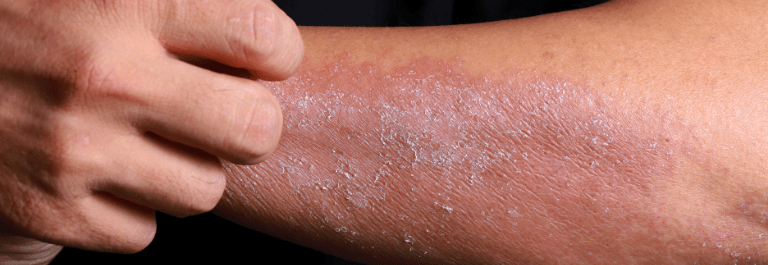Without question, living with eczema can make every day life challenging. It can affect how you work, spend your free time, sleep, and even what you choose to eat.
But can you get a disability for eczema benefits?
Whether you have eczema or have a family member who does, this post is for you. In it, we explore the financial, emotional, professional, and personal costs associated with this itchy skin condition.
What is it Like Living with Eczema?
Living with eczema can be hard and can come with its own set of challenges. Painful and debilitating, it can negatively affect a person’s education, career, and self-esteem. Additionally, it can significantly limit a person’s lifestyle.
Because of itchy skin, sleeping the recommended 7-8 hours each night can be difficult which can lead to restless nights and daytime fatigue. This can affect work performance and mood. In fact, according to the National Eczema Association, nearly 5.9 million workdays are lost annually because of eczema.
There are also significant financial costs when living with chronic eczema. Many people spend hundreds of dollars each year purchasing natural skincare products, investing in eczema-friendly clothing, and seeking alternative treatment methods. All of this can be expensive – especially in the long run.
Finally, living with eczema can have a negative effect on a person's emotional wellbeing. Many people with eczema experience anxiety, depression, and a rise in stress levels. This can lead to the need for therapy.
What are Your Symptoms Like?
If you’re wondering whether you can get a disability for eczema, it’s important to first consider your symptoms and the degree of severity. These can vary from person to person, ranging from mild to severe.
It is unlikely for eczema to be classified as a disability if symptoms are mild. While even mild symptoms can be irritating, painful, and uncomfortable, they aren’t necessarily physically debilitating.
In severe cases, however, people may have great difficulty using parts of their body, moving, walking, or sleeping. If relentless scratching occurs and the skin cracks or bleeds, eczema can lead to infection.
Another thing to consider when determining whether you qualify for eczema disability benefits is whether symptoms respond effectively to treatment or if they lead to recurring infections.
Common symptoms of eczema include:
- Inflamed skin
- Itching
- Patches of red rashes that may burn or sting
- Rough, leathery texture
- Dryness or flakiness
- Oozing skin
- Blisters that my ooze
- Scars if scratching causes the skin to bleed
Eligibility for Eczema Disability Benefits
The Social Security Administration (SSA) has set forth certain conditions that must be met in its disability listing called “Dermatitis.”
To qualify for eczema disability benefits, you must have been under professional medical treatments for at least three months prior to your claim.
That’s why it’s so important to keep documentation from visits with doctors and eczema treatments. This includes receipts and records of any purchases you made for treatments and skincare products.
The different types of eczema that are eligible for disability include atopic dermatitis, dyshidrotic dermatitis and allergic dermatitis.
Here are the different factors that can help you determine whether you may qualify for eczema disability benefits:
- Severity of the condition
- Frequency of flare-ups
- Locations where flare-ups usually occur
- How the condition prevents you from working
How to Manage Eczema Symptoms Naturally
Here are some natural remedies you can try to soothe your itchy eczema:
Moisturize Often
To combat dry skin and keep itchiness at bay, we recommend keeping your skin hydrated. A great way to moisturize your skin is with our Organic Manuka Skin Soothing Cream. Made with just 6 ingredients, it’s a safe and effective choice for even the most irritated skin.
Use a Natural Soap
Be kind to your skin with this soothing Coconut and Sunflower Oil Soap bar. You can use it as a full body soap or as a hand soap throughout the day. It offers a naturally light smell without added fragrance or perfume.
Try Wet Wrap Therapy
Wet wrap therapy is a fantastic way to give your skin a quick boost of hydration. Start by layering the affected area of your skin with a natural cream such as the Manuka cream mentioned earlier. Then add a wet layer overtop, followed by a dry layer. Leave the wet wrap on overnight or for a minimum of 2 hours.
Our Remedywear™ clothing line is a great choice to use as the wet or dry layer as the TENCEL and zinc-embedded fibers have healing properties. Some of our favorites include these hypoallergenic sleeves and Remedwear Long Shirt for Kids.










